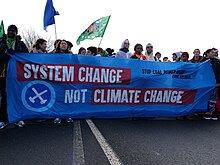 | |
| Native name | UN-Klimakonferenz in Bonn 2017 |
|---|---|
| Date | 6 November 2017– 17 November 2017 |
| Location | Bonn, Germany |
| Also known as | COP23 (UNFCCC) CMP13 (Kyoto Protocol) CMA1-2 or 1.2 (Paris Agreement) |
| Organized by | Republic of Fiji, Presidency of COP23 (organised in Germany for practical reasons) |
| Participants | Parties to the UNFCCC in the Bula Zone and Non-Party Stakeholders in the Bonn Zone |
| Previous event | ← Marrakech 2016 |
| Next event | Katowice 2018 → |
| Website | cop23 |


The 2017 United Nations Climate Change Conference (COP23) was an international meeting of political leaders, non-state actors and activists to discuss environmental issues. It was held at UN Campus in Bonn, Germany, during 6–17 November 2017.[1] The conference incorporated the 23rd Conference of the Parties to the United Nations Framework Convention on Climate Change (UNFCCC), the thirteenth meeting of the parties for the Kyoto Protocol (CMP13), and the second session of the first meeting of the parties for the Paris Agreement (CMA1-2 or CMA1.2).
The purpose of the conference was to discuss and implement plans about combating climate change, including the details of how the Paris Agreement will work after it enters into force in 2020.[1] The COP was presided over by the Prime Minister of Fiji, Frank Bainimarama, marking the first time a small-island developing state assumed the presidency of the negotiations. The German government provided considerable support that amounted to more than €117 million ($135.5 million) for the construction of the conference facilities.[2]
Although COP23 focused primarily on technical details of the Paris Agreement, it was the first conference of the parties to take place after President Donald Trump announced that the U.S. would withdraw from the agreement.
COP23 concluded with what was called the 'Fiji Momentum for Implementation', which outlined the steps that need to be taken in 2018 to make the Paris Agreement operational and launched the Talanoa Dialogue – a process designed to help countries enhance and implement their Nationally Determined Contributions by 2020.[3]
- ^ a b Damian Carrington, "The COP23 climate change summit in Bonn and why it matters " Archived 2019-10-07 at the Wayback Machine, The Guardian, 2017-11-05 (page visited on 2017-11-14).
- ^ "COP23: Is the Bonn summit worth the trouble?". Deutsche Welle. Archived from the original on 2019-11-13. Retrieved 2018-02-21.
- ^ "Fiji Momentum for Implementation-UNFCCC" (PDF). Archived (PDF) from the original on 2020-06-18. Retrieved 2017-11-17.